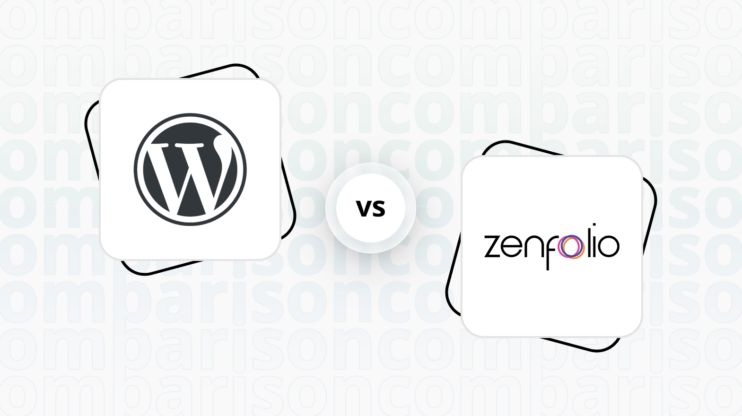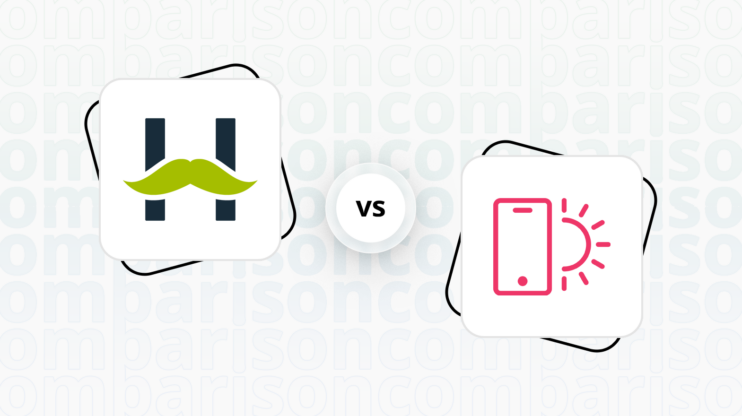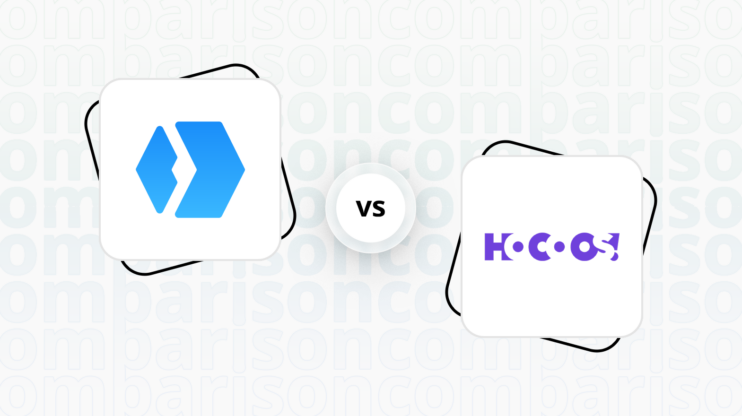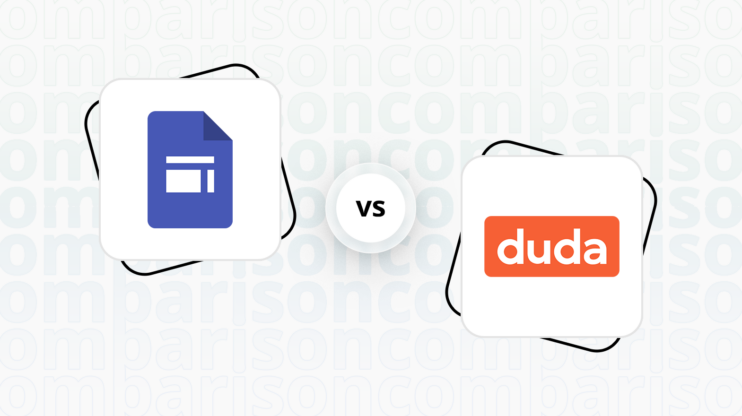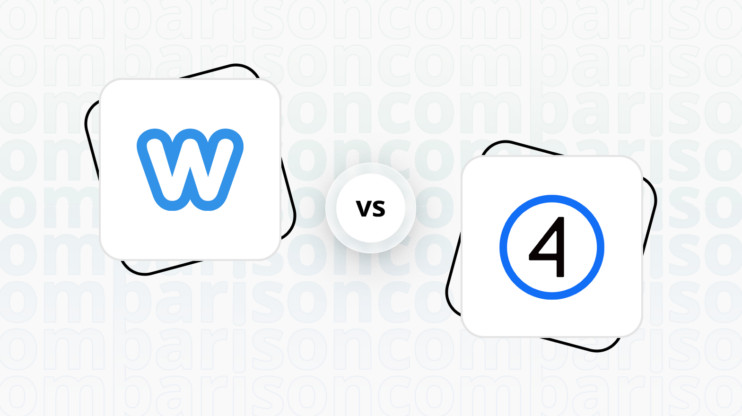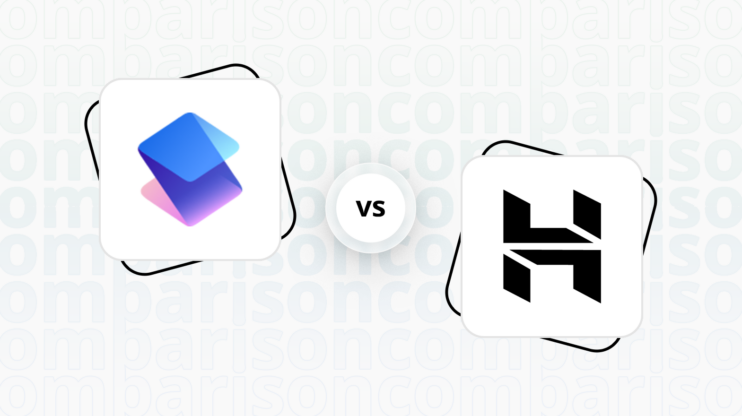Google Sites vs Adobe Commerce(ex Magento): Final verdict
Google Sites and Adobe Commerce (ex Magento) cater to different user needs, each excelling in their respective domains.
-
Google Sites (Overall Grade: 5.6/10)
is ideal for users seeking a simple, collaborative website builder with seamless integration with Google services. It offers a user-friendly interface, making it accessible for individuals and small businesses without technical expertise. However, it lacks advanced ecommerce features, making it less suitable for businesses looking to scale their online sales. -
Adobe Commerce (ex Magento) (Overall Grade: 6.9/10)
stands out for its robust ecommerce capabilities, advanced customization options, and scalability. It is designed for both B2B and B2C businesses, offering a comprehensive suite of tools for product management, customer engagement, and marketing. While it has a steeper learning curve and higher cost, it is the preferred choice for businesses aiming for extensive ecommerce functionalities and growth.

|

|
|
|---|---|---|
|
Design functionalities & templates |
4.9 |
6.7 |
|
Ease of use |
8.3 |
5.4 |
|
Ecommerce |
1.8 |
9.4 |
|
Website Editors |
7.0 |
7.8 |
|
Product testing options |
6.9 |
3.9 |
|
Price |
8.1 |
5.8 |
|
Hosting quality |
8.2 |
8.1 |
|
Website speed optimization |
3.3 |
6.6 |
|
Plugins/extensions and integrations |
6.4 |
9.1 |
|
Marketing features |
2.6 |
8.1 |
|
Customer support |
7.2 |
8.3 |
|
Website security |
9.3 |
8.4 |
|
AI capabilities |
0 |
7.7 |
|
User Management |
7.8 |
8.0 |
Which one is the best for ecommerce: Google Sites or Adobe Commerce(ex Magento)?
 1.8
1.8
 9.4
9.4
Verdict
: Adobe Commerce (ex Magento) is the clear winner for ecommerce, offering a comprehensive suite of features tailored for online businesses, while Google Sites lacks built-in ecommerce capabilities.
-
Google Sites
: Google Sites is primarily a tool for creating simple websites and does not have built-in ecommerce features. It can integrate third-party tools or widgets for basic ecommerce functionality, such as using Google Forms for order forms and integrating PayPal for transactions. However, it falls short in providing a full-fledged ecommerce platform. -
Adobe Commerce (ex Magento)
: Adobe Commerce is a versatile ecommerce platform suitable for both B2B and B2C businesses. It offers extensive features, including product and inventory management, order processing, customer account management, targeted marketing capabilities, diverse payment processing options, robust security measures, and scalability. This makes it an ideal choice for businesses looking to grow and manage complex ecommerce operations.
Which one is the best for informational and business websites?
 7.2
7.2
 7.4
7.4
Verdict
: When it comes to creating informational and business websites, Adobe Commerce (ex Magento) slightly edges out Google Sites, thanks to its advanced design functionalities and extensive customization options. However, Google Sites remains a strong contender for users seeking simplicity and ease of use.
-
Google Sites
: Google Sites is an excellent choice for those who need a straightforward, user-friendly platform to create informational websites. Its drag-and-drop interface and seamless integration with other Google services make it ideal for team projects, personal portfolios, and small business websites. With a score of 7.2, it offers a good balance of functionality and ease of use, making it accessible to users with no coding experience. -
Adobe Commerce (ex Magento)
: Adobe Commerce (ex Magento) is a versatile platform that excels in providing advanced design features and customization options. With a score of 7.4, it is well-suited for businesses that require a more robust and scalable solution. While it may have a steeper learning curve, its extensive range of tools for marketing, SEO, and customer engagement make it a powerful choice for creating comprehensive business websites.
Google Sites vs Adobe Commerce(ex Magento): Detailed comparison
Design functionalities & templates
Design FunctionalitiesRepresents how well each platform allows for creative design and customization of websites.Score Components:
- Template Variety (30%): Range and quality of design templates.
- Customization (30%): Flexibility and options for design alterations.
- User Interface (20%): Ease and intuitiveness of the design process.
- Responsiveness (10%): Adaptability to different devices and screen sizes.
- Innovation (10%): Unique design features and tools.
 4.9
4.9
 6.7
6.7
🏆
Winner: Adobe Commerce (ex Magento).
If you’re looking for a platform that offers more creative control, advanced functionalities, and a wide array of design features, Adobe Commerce (ex Magento) is the preferred choice.
Google Sites offers a limited number of templates suitable for various purposes, from personal blogs to business websites, with both free and premium options available. These templates are designed for user engagement, simplicity, and functionality, allowing for customization to meet specific needs.
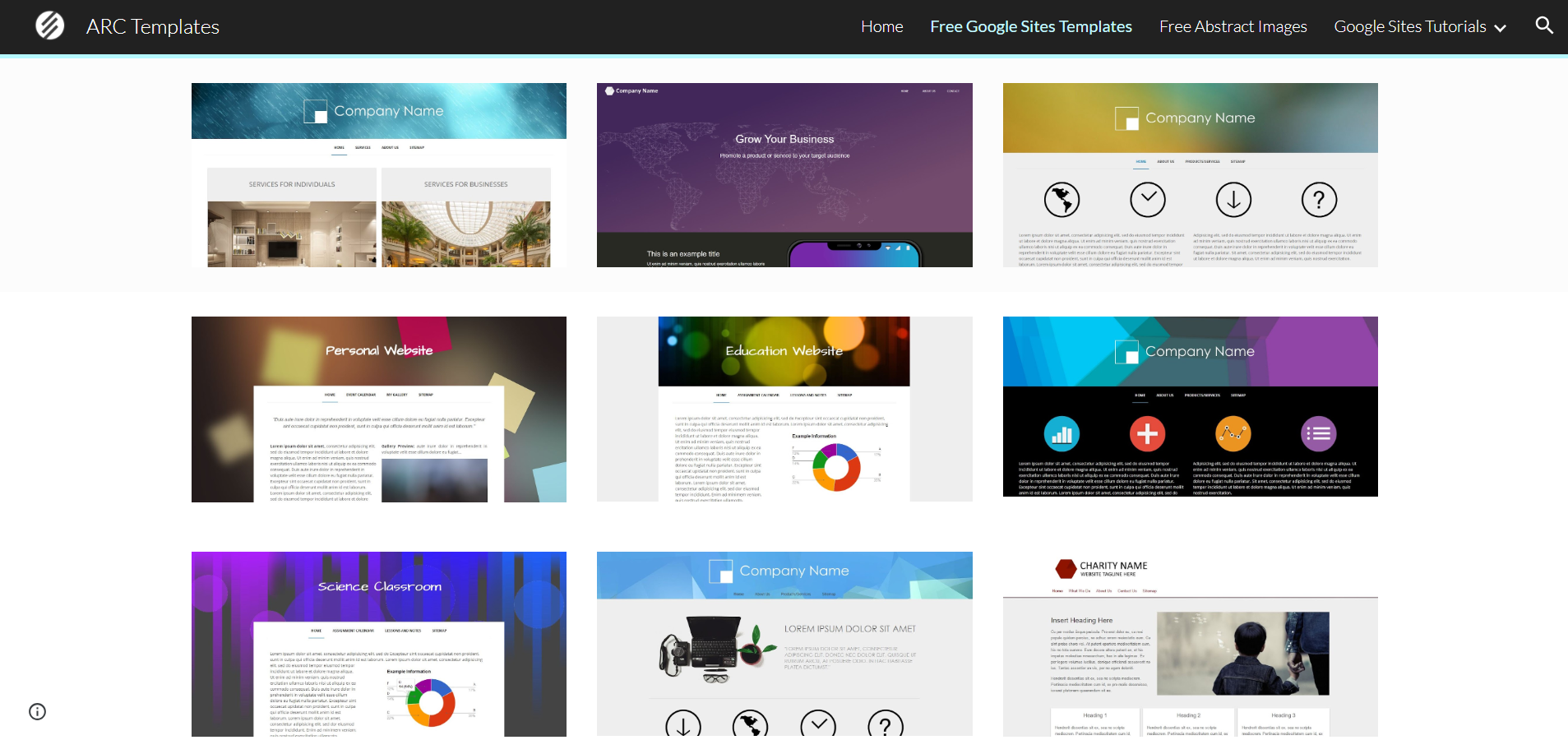

Compared to Google Sites, Adobe Commerce (ex Magento) prioritizes flexibility over pre-built templates. While it offers a limited selection of base themes, users can access third-party themes for customization. Theme options are highly adaptable, allowing changes to layouts, colors, fonts, and the creation of custom page layouts.
Adobe Commerce ex Magento Themes
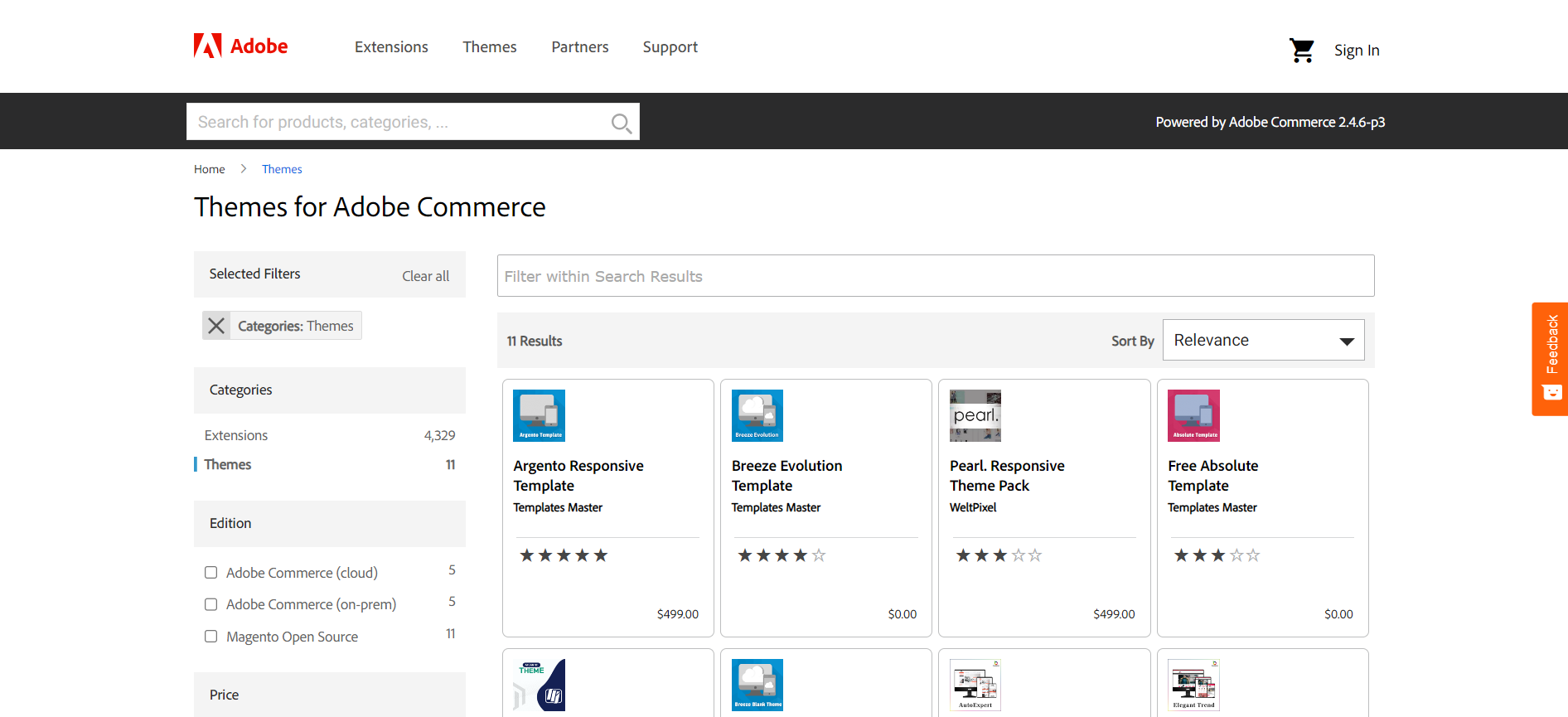
Get a head start on website creation with AI
Create a custom website tailored to your business needs 10X faster with 10Web AI Website Builder!
Ease of use
Ease of useReflects the platform’s overall user-friendliness.Score
Components:
- Learning curve (40%): Quickness and ease of getting started.
- Interface design (30%): Simplicity and intuitiveness of layout.
- User guidance (20%): Quality of tutorials and support.
- Flexibility (10%): Adaptability to various user skills.
 8.3
8.3
 5.4
5.4
🏆 Winner: Google Sites
. Scoring 8.3, Google Sites offers a user-friendly interface that allows individuals with no coding experience to create and publish websites easily. Adobe Commerce(ex Magento), with a score of 5.4, offers high customization capabilities and scalability, but its complexity can pose challenges for beginners without technical expertise.
Learning Resources
🏆 Winner: Adobe Commerce(ex Magento)
. While both platforms offer solid learning resources, Adobe Commerce(ex Magento) goes a step further with its wide array of videos, tutorials, and instructor-led courses, making it easier for users to learn and adapt.
For ecommerce
EcommerceMeasures the platform’s effectiveness in supporting online business activities.Score Components:
- Ecommerce themes and templates (20%): Variety and design of templates.
- Product management (25%): Ease of managing and organizing products.
- Payment options (25%): Variety and convenience of payment methods.
- Ecommerce features (20%): Features for managing an ecommerce store.
- Integration (10%): Compatibility with external e-commerce tools and services.
 1.8
1.8
 9.4
9.4
When it comes to ecommerce, Adobe Commerce (ex Magento) is a clear winner over Google Sites. Adobe Commerce is a comprehensive ecommerce platform designed for both B2B and B2C businesses. It offers a wide range of features, including product and inventory management, order processing, customer account management, targeted marketing capabilities, diverse payment processing options, robust security measures, and scalability to accommodate business growth.

|

|
|
|---|---|---|
|
Ecommerce themes and templates |
0.0 |
7.5 |
|
Product page customization |
0.0 |
9.0 |
|
Payment processing and commissions |
1.0 |
7.8 |
|
POS capabilities |
0.0 |
7.0 |
|
Payment gateways |
2.0 |
8.5 |
|
Product numbers |
0.0 |
7.5 |
|
Additional ecommerce features |
0.5 |
8.0 |
Adobe Commerce ecommerce features:
- Product and Inventory Management
- Order Management
- Customer Management
- Marketing and Promotions
- Payment Processing
- Multi-Channel Commerce
Google Sites ecommerce features:
- Google Sites does not have built-in ecommerce features.
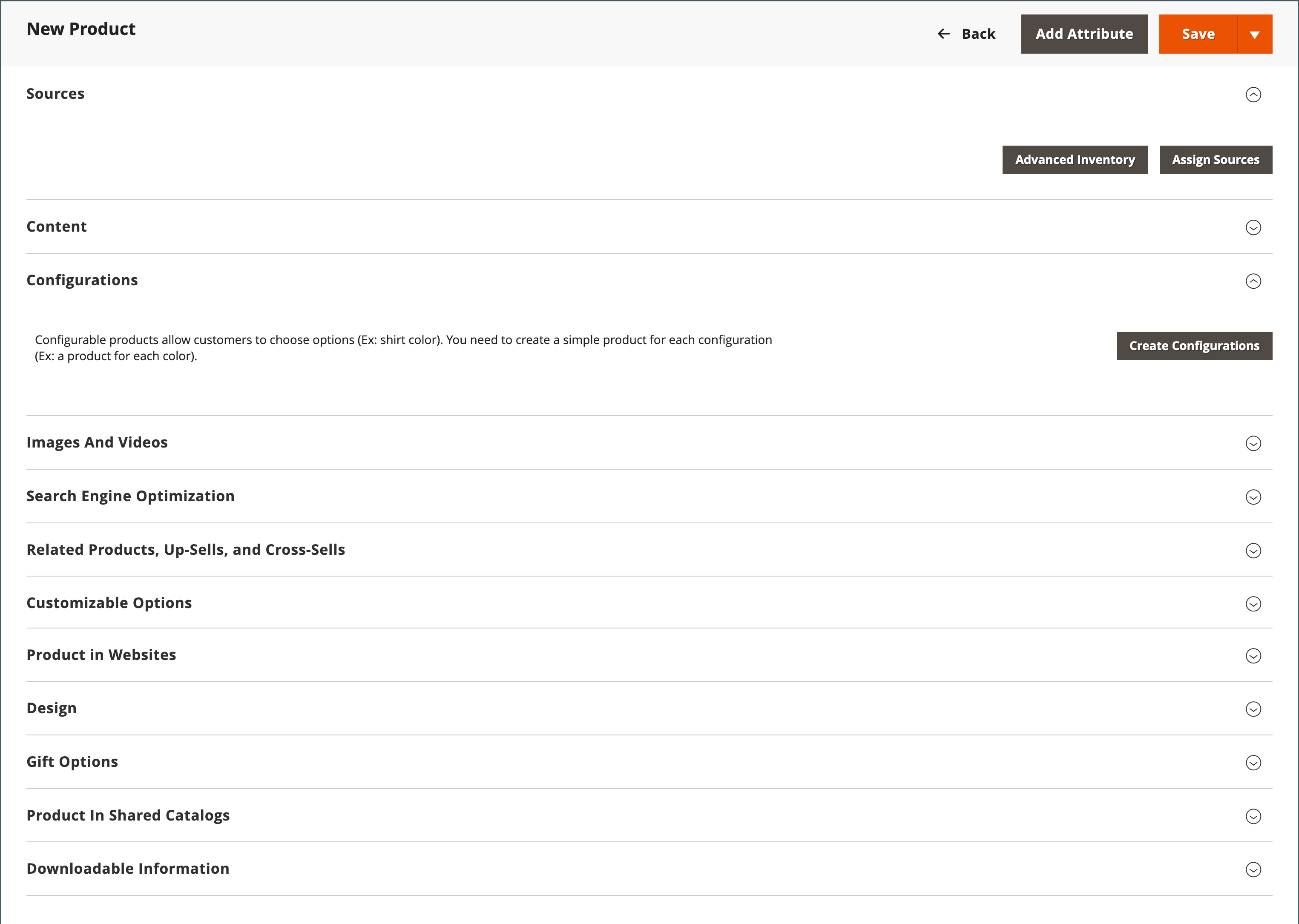
Ecommerce themes & templates
Adobe Commerce offers a comprehensive ecosystem for ecommerce themes and templates, enabling businesses to customize their online stores to meet specific branding and functionality requirements. Themes in Adobe Commerce serve as the visual and structural framework for online stores, incorporating layout files, template files, translation files, and skins to define the look and feel. Google Sites, however, does not have any ecommerce templates.
Product page customization
Adobe Commerce offers extensive customization options for product pages, enabling businesses to enhance the user experience and tailor product displays to their specific needs. This includes customizing layouts, product attributes, images and media, dynamic content like related products and reviews, and custom product options such as configurable and bundled products. These customizations can help businesses create a unique and user-friendly online shopping experience. Google Sites, on the other hand, lacks any product page customization features.
Payment processing
Adobe Commerce offers integrated payment solutions and commission management for seamless online transactions, alongside POS integration for omnichannel retail experiences. It supports a wide array of payment gateways, ensuring flexible and secure payment options for customers. Google Sites, however, does not have native payment features. You can integrate payment gateways into Google Sites using external tools or links, but this requires embedding HTML code for payment buttons from services like PayPal, Square, or Stripe, or linking to an external checkout page. Third-party ecommerce widgets also offer a way to add payment functionalities. However, Google Sites doesn’t offer the comprehensive ecommerce capabilities that dedicated platforms like Adobe Commerce provide.
Website Editors
Website EditorsEvaluates the platforms’ website building and editing capabilities.Score Components:
- Customization tools (40%): Range and power of editing features.
- Editor usability (30%): User experience within the editor.
- Design flexibility (20%): Freedom in layout and design changes.
- Update and maintenance ease (10%): Simplicity of updating and maintaining the site.
 7.0
7.0
 7.8
7.8
🏆
Winner: Adobe Commerce(ex Magento)
. Adobe Commerce(ex Magento), with a score of 7.8, offers a robust ecommerce platform designed for flexibility and scalability, enabling businesses to create customized online stores with extensive features for product management, customer engagement, and analytics. It supports both B2B and B2C models and offers a range of tools for marketing, SEO, and inventory management, along with a vast ecosystem of extensions. Suitable for businesses of all sizes, Adobe Commerce provides options for cloud-hosting or self-hosting, catering to a wide array of ecommerce needs.
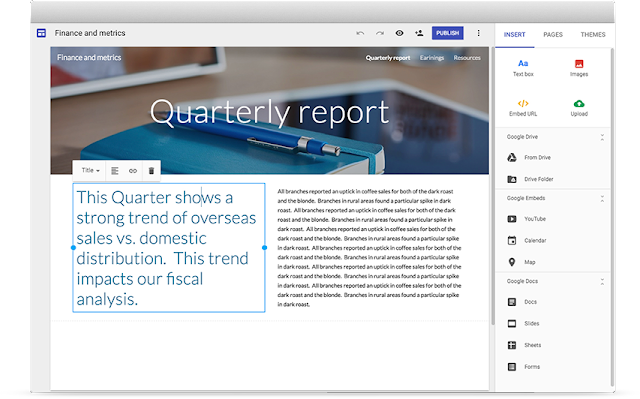
Google Sites’ editor, scoring 7.0, offers a user-friendly website builder editor that allows users to create and design websites without needing coding knowledge. With its drag-and-drop interface, users can easily add, customize, and arrange elements such as text, images, and videos on their web pages. It also provides a variety of templates and design options to help users get started quickly and ensure their site looks professional. Additionally, Google Sites integrates seamlessly with other Google services, enabling the incorporation of Google Docs, Sheets, Slides, and Maps directly into the website.
Mobile editor/app
 0
0
 0
0
🏆
Winner: None
. Unfortunately, neither Google Sites nor Adobe Commerce (ex Magento) offers a mobile editor or app for website editing. This means that users of both platforms will need to rely on desktop interfaces for website creation and management. While both platforms offer robust features and tools for website building, the lack of a mobile editing option may limit the flexibility and convenience for users who prefer to manage their websites on the go. Therefore, if mobile editing is a crucial factor for you, you might want to consider other website builders that offer this feature.
Product testing options
Product Testing OptionsAssesses the options for trying out platform features before commitment.Score Components:
- Trial quality (40%): Extent and usefulness of the trial or free version.
- Feature accessibility (30%): How many features are available to test.
- Trial duration (20%): Length of the trial period.
- Ease of transition (10%): Smoothness of moving from trial to paid plans.
 6.9
6.9
 3.9
3.9
Overall Result
:
Google Sites Wins
. Google Sites scores 6.9, offering a free version and a 14-day free trial with the possibility to test some premium features. Adobe Commerce(ex Magento), scoring 3.9, does not offer a free or trial version, but allows testing of premium features through a demo version. However, neither platform offers a money-back guarantee.

|

|
|
|---|---|---|
|
Free Plan |
Yes |
No |
|
Trial Duration |
14 days |
No |
|
Testing Premium Features |
Possible within trial period |
Possible through demo version |
|
Money Back Guarantee |
No | No |
Price
PriceLooks at the cost-effectiveness and value for money of each platform.Score Components:
- Plan value (40%): What each pricing tier offers.
- Transparency and clarity (30%): Clearness of pricing structures.
- Flexibility of plans (20%): Range of options to suit different budgets.
- Hidden costs (10%): Additional expenses not included in the plan.
 8.1
8.1
 5.8
5.8
Google Sites offers a range of plans with different features and prices, while Adobe Commerce(ex Magento) has a more opaque pricing structure, with prices starting from around $2,000.

|

|
|
|---|---|---|
|
$0-$10 |
Business Starter ($7.20/month): This plan includes basic features suitable for individuals or small businesses, offering professional email through Gmail, 30GB of storage per user, and video meetings for up to 100 participants. It allows to manage 1 website and there is no limitation on number of pages. Value for price: 6.0 |
No offering at this amount. |
|
$10-$20 |
Business Standard ($14.40/month): Suitable for growing businesses, this plan provides 2 TB of storage per user, video meeting capacity for up to 150 participants with recording features, and access to smart booking pages and shared drives. It allows to manage 1 website and there is no limitation on number of pages. Value for price: 7.5 |
No offering at this amount. |
|
$20-$30 |
Business Plus ($21.60/month): Designed for larger businesses needing more robust capabilities, offering 5 TB of storage per user, advanced security options, and video meetings for up to 500 participants. It allows to manage 1 website and there is no limitation on number of pages. Value for price: 8.5 |
No offering at this amount. |
|
$2000+ |
No offering at this amount. |
Adobe Commerce Pro and Managed Services ($2000/month): Adobe Commerce Pro and Managed Services are designed to deliver scalable, secure, and extensive eCommerce solutions tailored to a wide range of business demands. It offers a comprehensive set of ecommerce tools, including product and inventory management, efficient order processing, customer account management, targeted marketing capabilities, diverse payment processing options, robust security measures, and scalability to accommodate business growth. It also offers both self-hosted and cloud-hosted options, providing flexibility and optimized performance. While it does not have an AI website builder, it offers a powerful theme framework for comprehensive control, including frontend editing for basic adjustments. Experienced developers can employ custom code for unique designs and advanced functionalities. |
location. As a result in rare cases the prices displayed here can differ from the ones you see on their
websites.
Hosting quality
Hosting
qualityExamines the reliability and performance of the hosting solutions.Score Components:
- Uptime (40%): Consistency and reliability of website availability.
- Speed (30%): Loading times and performance.
- Bandwidth and storage (20%): Sufficiency of resources provided.
- Data centers (10%): Quality and distribution of hosting infrastructure.
 8.2
8.2
 8.1
8.1
🏆
Winner: Google Sites
Google Sites offers cloud-based managed hosting with a 99.9% uptime guarantee and a vast network of 21 data centers globally. Adobe Commerce, on the other hand, provides both self-hosted and managed hosting options, with uptime guarantee for managed hosting. However, it does not disclose specific data center details. Despite Adobe Commerce’s flexibility and optimized performance, Google Sites’ transparency and reliability give it a slight edge in this category.

|

|
|
|---|---|---|
|
Do they offer hosting? |
Yes, basic storage with 100MB free per site, can be increased by upgrading to Google Workspace |
Yes, robust and scalable eCommerce solutions with both self-hosted and cloud-hosted options |
|
Data Centers: |
21 globally: 2 in Asia, 5 in Europe, 13 in US and 1 in South America |
Adobe Commerce on Cloud infrastructure Leverages Amazon Web Services (AWS), Specific data center details not publicly available |
|
Type of hosting: |
Cloud based managed hosting |
Self Hosting, Managed Hosting |
|
Uptime: |
99.9% |
Uptime Guarantee for Adobe Managed hosting is provided |
|
Uptime Guarantee: |
Yes, 99.9% |
Provided for Adobe Managed hosting |
Website Speed Optimization
Website Speed OptimizationEvaluates optimization of website loading timesScore Components:
- PageSpeed Score (30%): Google’s score indicating performance optimization.
- Loading Time (30%): The average time until a website is fully interactive.
- Mobile Optimization (15%): Optimization effectiveness for mobile devices.
- Resource Optimization (15%): Optimizing images, scripts, and other heavy resources.
- CDN Usage (10%): Use of CDN to enhance speed across geolocations.
 3.3
3.3
 6.6
6.6
🏆 Winner: Adobe Commerce(ex Magento)
Both Google Sites and Adobe Commerce (ex Magento) prioritize website performance and page speed, with Google Sites focusing on automated optimization, CDN, mobile optimization, browser caching, code minification, and use of AMP, and Adobe Commerce (ex Magento) emphasizing CDN, database optimization, caching, and indexing. However, Adobe Commerce (ex Magento) has a higher website speed optimization score.

|

|
|
|---|---|---|
|
Focus |
Automated Optimization, CDN, Mobile Optimization, Browser Caching, Code Minification, Use of AMP |
CDN, Database optimization, Caching, Indexing |
|
Performance Tools |
Google Lighthouse, PageSpeed Insights |
Google PageSpeed Insights Integration |
|
Key Strategies |
Automated Optimization, CDN, Mobile Optimization, Browser Caching, Code Minification, Use of AMP |
CDN, Database optimization, Caching, Indexing |
|
Load Times |
Google does not disclose statistics about website Page Speed scores, or load times |
Varies widely, dependent on optimization |
|
Page Speed Scores Range |
Google does not disclose statistics about website Page Speed scores, or load times |
Scores vary; influenced by plugins, images |
|
Core Web Vitals Improvement |
Emphasis on LCP, FID, CLS improvements |
Emphasis on LCP, FID, CLS improvements |
Adobe Commerce (ex Magento) has a comprehensive approach to website speed optimization, focusing on CDN, database optimization, caching, and indexing. The platform’s load times and PageSpeed scores vary widely, influenced by plugins and images. Adobe Commerce (ex Magento) also places emphasis on improving Core Web Vitals, specifically LCP, FID, and CLS.
Google Sites, on the other hand, focuses on automated optimization, CDN, mobile optimization, browser caching, code minification, and use of AMP for website speed optimization. However, Google does not disclose statistics about website Page Speed scores or load times. Like Adobe Commerce (ex Magento), Google Sites also emphasizes on improving Core Web Vitals, specifically LCP, FID, and CLS.
Get a head start on website creation with AI
Create a custom website tailored to your business needs 10X faster with 10Web AI Website Builder!
Plugins and integrations
Plugins and integrationsMeasures the range and effectiveness of additional plugins and integrations.Score Components:
- Variety of options (40%): Range of available add-ons.
- Integration smoothness (30%): Ease of integrating plugins into the site.
- Quality of plugins (20%): Functionality and reliability of the options.
- Custom integration capabilities (10%): Support for custom or third-party integrations.
 6.4
6.4
 9.1
9.1
🏆 Winner: Adobe Commerce(ex Magento).
Adobe Commerce(ex Magento) scores a high 9.1, offering a vast array of extensions and plugins, estimated to be in the tens of thousands, covering aspects such as marketing, payment processing, shipping, content management, security, and optimization. Google Sites, with a score of 6.4, offers a wide array of plugins and extensions to enhance website functionality, but falls short in comparison to the extensive offerings of Adobe Commerce(ex Magento).
It’s worth noting that while Adobe Commerce(ex Magento) offers more extensive options, Google Sites may be a more cost-effective choice for users with simpler needs or smaller budgets.

Adobe Commerce(ex Magento) Applications
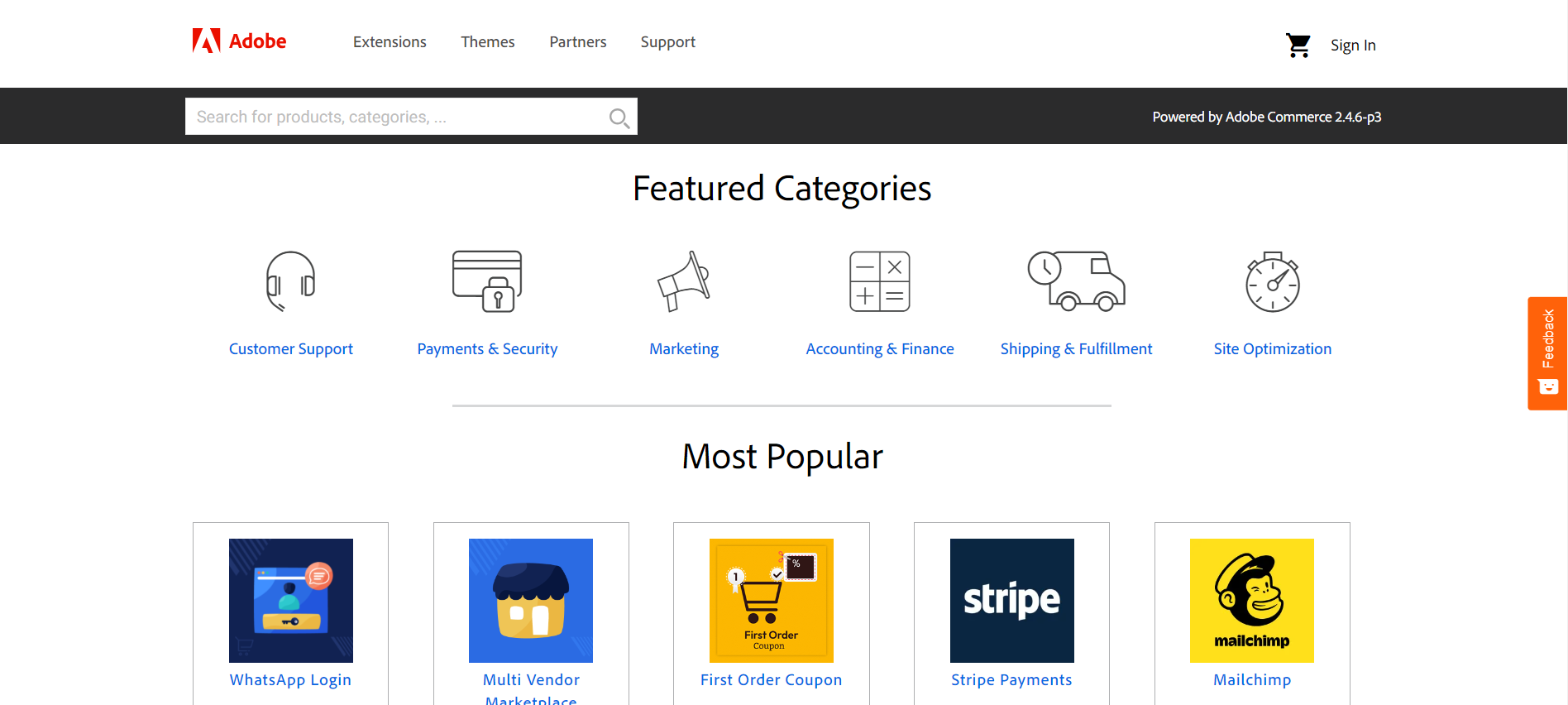
Marketing Features
Design FunctionalitiesRepresents how well each platform allows for creative design and customization of websites.Score Components:
- Template Variety (30%): Range and quality of design templates.
- Customization (30%): Flexibility and options for design alterations.
- User Interface (20%): Ease and intuitiveness of the design process.
- Responsiveness (10%): Adaptability to different devices and screen sizes.
- Innovation (10%): Unique design features and tools.
 2.6
2.6
 8.1
8.1
🏆
Overall Winner: Adobe Commerce(ex Magento)
. Adobe Commerce(ex Magento) offers a comprehensive suite of marketing features, including advanced SEO tools, email marketing, blogging, social media integration, detailed analytics and reporting, and sophisticated ads and promotions management. Google Sites, on the other hand, offers basic SEO settings, social media integration, and Google Analytics integration, but lacks email marketing, blogging, and ads and promotions features.
| Marketing Features |

|

|
|---|---|---|
|
SEO Tools |
Basic SEO settings | Advanced SEO tools |
|
Email Marketing |
No | Yes |
|
Blogging |
No | Yes |
|
Social Media Integration |
Yes | Yes |
|
Analytics and Reporting |
Google Analytics integration | Detailed analytics and reporting |
|
Ads and Promotions |
No | Advanced ads and promotions management |
Customer Support
Customer supportEvaluates the quality and availability of support options.Score Components:
- Response time (40%): Speed of support responses.
- Support quality (30%): Effectiveness and helpfulness of the support.
- Availability (20%): Range of support channels (phone, chat, email).
- Resource richness (10%): Quality of self-help and educational materials.
 7.2
7.2
 8.3
8.3
🏆 Winner: Adobe Commerce(ex Magento)
. When comparing Google Sites vs Adobe Commerce(ex Magento), Adobe Commerce takes the lead with its robust 24/7 customer support available through phone, email, and live chat. Adobe Commerce also offers a comprehensive knowledge base, community forums, and extensive documentation, ensuring users have multiple avenues for assistance. For enterprise users, Adobe Commerce provides dedicated account management and access to a global network of experts, enhancing the support experience.
Google Sites, on the other hand, primarily offers self-service resources like a Help Center and community forums. Direct support, including phone, email, and live chat, is available to Google Workspace customers, with varying levels of support based on the subscription tier. While Google Sites provides 24/7 support for critical issues to eligible customers, its support options are more limited compared to Adobe Commerce, especially for free users.
Security
SecurityLooks at the platforms’ security measures and data protection.Score Components:
- Data protection (40%): Safeguards for user and customer data.
- SSL and encryption (30%): Implementation of secure connections.
- Compliance (20%): Adherence to industry security standards.
- Regular updates (10%): Frequency of security updates and patches.
 9.3
9.3
 8.4
8.4
🏆
Winner: Google Sites
. Google Sites, part of the Google Workspace, offers robust security measures including SSL encryption, two-factor authentication, and automatic malware scanning. It also benefits from Google’s regular security updates and compliance with international data protection standards. Google’s infrastructure provides DDoS protection and data redundancy, ensuring site accessibility even under heavy traffic.
Adobe Commerce (formerly Magento), while offering a range of security measures including regular updates, secure payment processing, and tools for monitoring suspicious activity, falls slightly short in comparison to Google Sites. However, it still provides a secure environment for online stores, protecting customer data and addressing vulnerabilities promptly.
AI Capabilities
AI capabilitiesMeasures the effectiveness of AI-driven features and tools.Score Components:
- Automation efficiency (40%): Impact of AI on streamlining processes.
- Personalization (30%): AI-driven customization for users or customers.
- AI-Assisted design (20%): Role of AI in website design and functionality.
- Data analysis (10%): Use of AI in interpreting user data and analytics.
 0
0
 7.7
7.7

|

|
|
|---|---|---|
|
Personalized Design |
|
|
|
SEO Optimization |
|
AI-driven SEO optimization for content |
|
Customer Behavior Analysis |
|
AI-powered analysis of shopper behavior and trends |
|
Sales Predictions |
|
AI-aided inventory forecasting and price optimization |
|
Inventory Management |
|
AI-driven inventory management |
|
Content Generation |
|
AI-assisted content creation and optimization |
🏆 Winner: Adobe Commerce (ex Magento)
. Adobe Commerce (ex Magento) offers a range of AI capabilities that enhance the eCommerce experience, including personalized product recommendations, visual search capabilities, inventory management, price optimization, content creation and optimization, customer service, security, and marketing. These AI capabilities streamline operations, foster customer loyalty, and drive efficient marketing strategies.
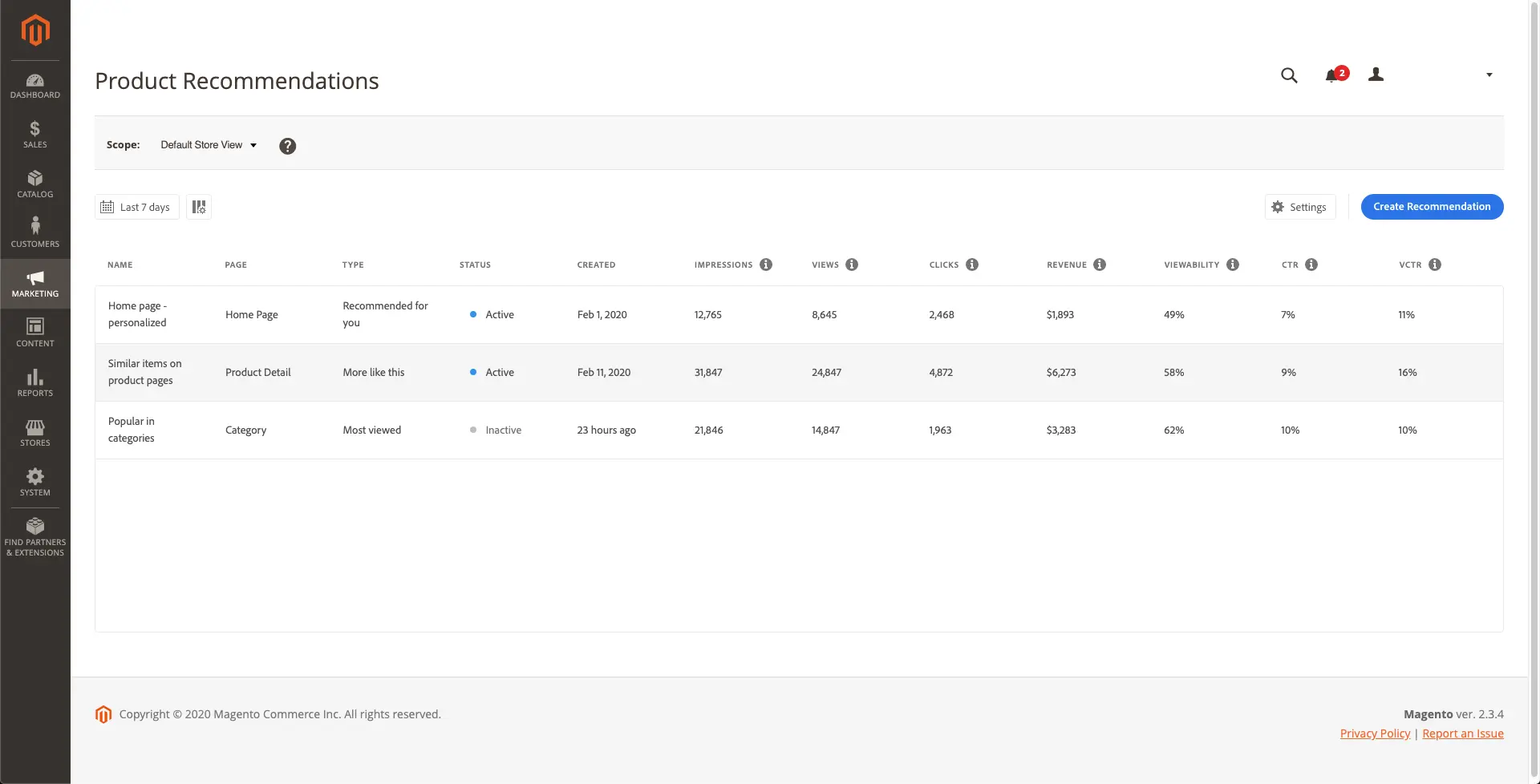
Google Sites, with a score of 0, does not have any AI capabilities. It is a structured web page-creation tool that allows users to build websites easily without having to know how to code, using a drag-and-drop interface. Users can integrate various Google services, such as Google Drive, Maps, and Calendar, directly into their websites. It’s designed for collaboration, allowing multiple users to work on a site simultaneously, making it a popular choice for team projects, personal portfolios, and small business websites.
User Management
User ManagementAssesses the platforms’ capabilities in managing user roles, permissions, and accessibility.Score Components:
- Role Customization (40%): Flexibility in creating and defining user roles and
permissions. - Ease of Management (30%): User interface and tools for managing users.
- Access Control (20%): Effectiveness of access control measures for different user
levels. - Scalability (10%): Ability to manage a growing number of users efficiently.
 7.8
7.8
 8.0
8.0
🏆 Winner: Adobe Commerce(ex Magento)
. Both Google Sites and Adobe Commerce(ex Magento) offer different levels of user roles and access, but Adobe Commerce(ex Magento) provides a more detailed and role-specific user management system.
- Google Sites allows multiple users to collaborate with different roles, including Owners, who have full control, and Editors, who can modify content but not site settings. There’s no strict limit on the number of users who can edit a site, allowing flexibility in management and development. Viewers can only see the site, with no editing permissions. This structure supports collaborative website building with varied levels of access and control for different users.
- The number of users who can edit an Adobe Commerce website depends on user licenses and roles. User licenses, bought separately, determine the total number of users allowed, with additional licenses purchasable as needed. Roles and permissions, managed within the available licenses, control access and modifications, ensuring data security and efficient workflow.
Adobe Commerce(ex Magento) User Roles and Access Levels:
| Role | Description | Access Highlights |
|---|---|---|
| Administrator | Has full permissions to all aspects of Adobe Commerce, including global settings and data. | Full access to all settings, data, and functionalities within Adobe Commerce. Can manage other users’ roles and permissions. |
| Store Administrator | Responsible for the day-to-day management of the store, including products, orders, and customer service. | Access to manage products, process orders, and handle customer inquiries, but may have restricted access to sensitive global settings or data. |
| Design Team Member | Focuses on the aesthetic and user experience aspects of the store, working on content design and layout. | Access to content design tools and functionalities, but restricted from accessing customer, order information, and other sensitive areas. |
| Default User (B2B) | Has view-only access to company profile and credit information, and full access to activities related to sales and quotes. | Full access to sales and quotes activities; view-only for company profile and credit information. |
| Senior Buyer (B2B) | Engaged in purchasing, with access to all Sales and Quotes resources, and view-only permissions to the Company Profile, User and Teams, Payment Information, and Company Credit. | Comprehensive access to Sales and Quotes, with limited viewing rights for company’s financial and profile data. |
| Assistant Buyer (B2B) | Assists in purchasing activities, with permissions to place orders using Checkout with Quote, and to view orders, quotes, and company profile information. | Permission to execute orders and access relevant purchasing data; view-only access to company profile information. |
Additional Features

|

|
|
|---|---|---|
|
SSL Certificate |
|
|
|
Custom Domain |
|
|
|
Free Custom Domain Included |
|
|
|
International Domains |
|
|
|
Mobile Responsive |
|
|
|
Page Speed |
|
|
|
Website Builder Mobile App |
|
|
|
Convert a Website To An App |
|
|
|
Website Analytics |
|
|
|
Multilingual Sites |
|
|
|
Multiple Users |
|
|
Google Sites vs Adobe Commerce(ex Magento): User Feedback
Users consistently praise Google Workspace, particularly Google Sites, for its seamless integration, ease of use, and collaborative features, making it a go-to solution for various professional and educational needs. The platform’s simplicity and user-friendly interface are lauded, enabling effortless website creation and sharing of information within organizations. While some users desire more customization options and additional features, overall, Google Workspace remains highly valued for its versatility and streamlined workflow facilitation.
Adobe Commerce (formerly Magento Commerce) receives high praise for its comprehensive ecommerce solutions, offering features like customer and order management, scalability, and customization options. Users appreciate its flexibility and ease of use, although some mention a learning curve due to its extensive features. Despite occasional drawbacks like slow speed or complexity, Adobe Commerce proves beneficial for businesses seeking robust ecommerce platforms, aiding in sales growth, customer management, and overall efficiency in managing online stores.
The making of this blog
We followed a clear, step-by-step process to write and research this article.
Google Sites vs Adobe Commerce(ex Magento): FAQ
Which platform is better for ecommerce, Google Sites or Adobe Commerce (ex Magento)?
Can I use Google Sites for a professional business website?
How do Google Sites and Adobe Commerce (ex Magento) compare in terms of ease of use?
What are the main differences in hosting quality between Google Sites and Adobe Commerce (ex Magento)?
Which platform offers better customer support, Google Sites or Adobe Commerce (ex Magento)?
Are there any AI capabilities in Google Sites or Adobe Commerce (ex Magento)?
How do the platforms compare in terms of security?










